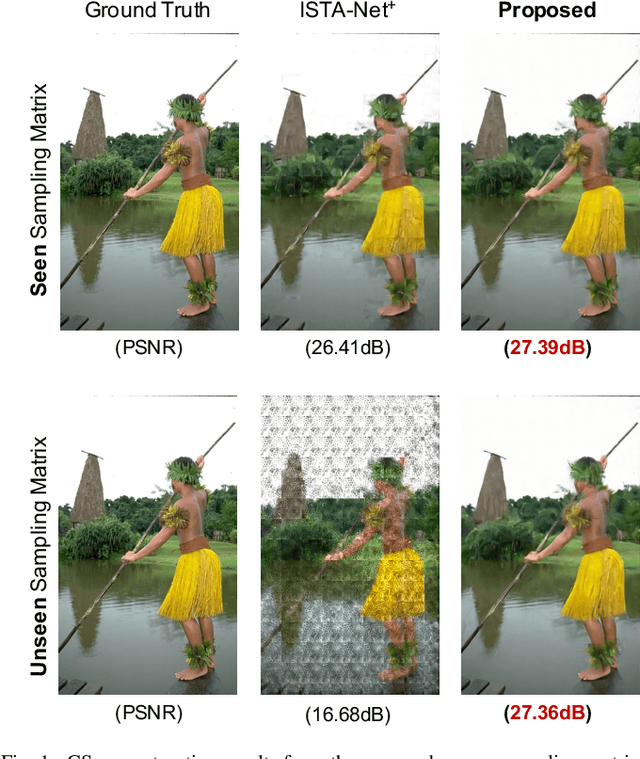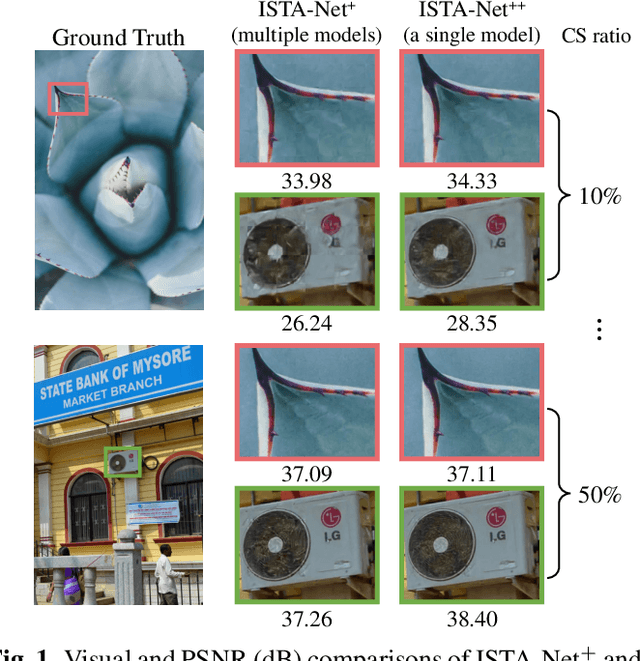Jingfen Xie
Deep Physics-Guided Unrolling Generalization for Compressed Sensing
Jul 18, 2023Abstract:By absorbing the merits of both the model- and data-driven methods, deep physics-engaged learning scheme achieves high-accuracy and interpretable image reconstruction. It has attracted growing attention and become the mainstream for inverse imaging tasks. Focusing on the image compressed sensing (CS) problem, we find the intrinsic defect of this emerging paradigm, widely implemented by deep algorithm-unrolled networks, in which more plain iterations involving real physics will bring enormous computation cost and long inference time, hindering their practical application. A novel deep $\textbf{P}$hysics-guided un$\textbf{R}$olled recovery $\textbf{L}$earning ($\textbf{PRL}$) framework is proposed by generalizing the traditional iterative recovery model from image domain (ID) to the high-dimensional feature domain (FD). A compact multiscale unrolling architecture is then developed to enhance the network capacity and keep real-time inference speeds. Taking two different perspectives of optimization and range-nullspace decomposition, instead of building an algorithm-specific unrolled network, we provide two implementations: $\textbf{PRL-PGD}$ and $\textbf{PRL-RND}$. Experiments exhibit the significant performance and efficiency leading of PRL networks over other state-of-the-art methods with a large potential for further improvement and real application to other inverse imaging problems or optimization models.
PUERT: Probabilistic Under-sampling and Explicable Reconstruction Network for CS-MRI
Apr 24, 2022



Abstract:Compressed Sensing MRI (CS-MRI) aims at reconstructing de-aliased images from sub-Nyquist sampling k-space data to accelerate MR Imaging, thus presenting two basic issues, i.e., where to sample and how to reconstruct. To deal with both problems simultaneously, we propose a novel end-to-end Probabilistic Under-sampling and Explicable Reconstruction neTwork, dubbed PUERT, to jointly optimize the sampling pattern and the reconstruction network. Instead of learning a deterministic mask, the proposed sampling subnet explores an optimal probabilistic sub-sampling pattern, which describes independent Bernoulli random variables at each possible sampling point, thus retaining robustness and stochastics for a more reliable CS reconstruction. A dynamic gradient estimation strategy is further introduced to gradually approximate the binarization function in backward propagation, which efficiently preserves the gradient information and further improves the reconstruction quality. Moreover, in our reconstruction subnet, we adopt a model-based network design scheme with high efficiency and interpretability, which is shown to assist in further exploitation for the sampling subnet. Extensive experiments on two widely used MRI datasets demonstrate that our proposed PUERT not only achieves state-of-the-art results in terms of both quantitative metrics and visual quality but also yields a sub-sampling pattern and a reconstruction model that are both customized to training data.
COAST: COntrollable Arbitrary-Sampling NeTwork for Compressive Sensing
Jul 15, 2021



Abstract:Recent deep network-based compressive sensing (CS) methods have achieved great success. However, most of them regard different sampling matrices as different independent tasks and need to train a specific model for each target sampling matrix. Such practices give rise to inefficiency in computing and suffer from poor generalization ability. In this paper, we propose a novel COntrollable Arbitrary-Sampling neTwork, dubbed COAST, to solve CS problems of arbitrary-sampling matrices (including unseen sampling matrices) with one single model. Under the optimization-inspired deep unfolding framework, our COAST exhibits good interpretability. In COAST, a random projection augmentation (RPA) strategy is proposed to promote the training diversity in the sampling space to enable arbitrary sampling, and a controllable proximal mapping module (CPMM) and a plug-and-play deblocking (PnP-D) strategy are further developed to dynamically modulate the network features and effectively eliminate the blocking artifacts, respectively. Extensive experiments on widely used benchmark datasets demonstrate that our proposed COAST is not only able to handle arbitrary sampling matrices with one single model but also to achieve state-of-the-art performance with fast speed. The source code is available on https://github.com/jianzhangcs/COAST.
* Published in IEEE Transactions on Image Processing, 2021
ISTA-Net++: Flexible Deep Unfolding Network for Compressive Sensing
Mar 22, 2021



Abstract:While deep neural networks have achieved impressive success in image compressive sensing (CS), most of them lack flexibility when dealing with multi-ratio tasks and multi-scene images in practical applications. To tackle these challenges, we propose a novel end-to-end flexible ISTA-unfolding deep network, dubbed ISTA-Net++, with superior performance and strong flexibility. Specifically, by developing a dynamic unfolding strategy, our model enjoys the adaptability of handling CS problems with different ratios, i.e., multi-ratio tasks, through a single model. A cross-block strategy is further utilized to reduce blocking artifacts and enhance the CS recovery quality. Furthermore, we adopt a balanced dataset for training, which brings more robustness when reconstructing images of multiple scenes. Extensive experiments on four datasets show that ISTA-Net++ achieves state-of-the-art results in terms of both quantitative metrics and visual quality. Considering its flexibility, effectiveness and practicability, our model is expected to serve as a suitable baseline in future CS research. The source code is available on https://github.com/jianzhangcs/ISTA-Netpp.
 Add to Chrome
Add to Chrome Add to Firefox
Add to Firefox Add to Edge
Add to Edge